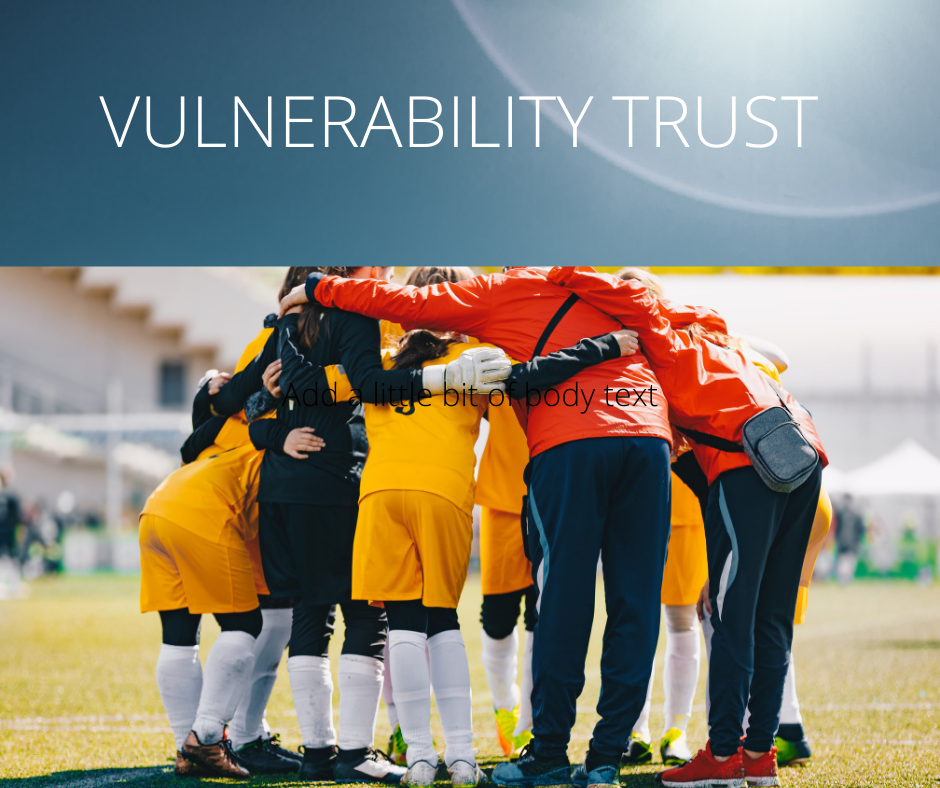Vulnerability is the birthplace of love, belonging, joy, courage, empathy, and creativity. It is the source of hope, empathy, accountability, authenticity. Brené Brown
A major factor that influences how well coaches and athletes empower each other is trust. Patrick Lencioni, founder of the Five Behaviors of a Cohesive Team program, says that there are two types of trust on teams. Predictive trust is about knowing how others will respond around you. Coaches develop a playbook on how their athletes respond to different situations, and athletes can get a sense of how their coach responds. However, vulnerability trust is present when coaches allow and invite risk to grow individually and as a team. Lencioni says “In the context of building a team, trust is the confidence among team members that their peers’ intentions are good, and that there is no reason to be protective or careful around the group. In essence, teammates must get comfortable being vulnerable with one another.” Lencioni claims that trust leads to four other essential components of high-functioning teams: healthy conflict so that people can speak honestly about shortcomings and other realities, commitment, accountability, and a focus on results.
At Middlebury College, Katharine DeLorenzo, head women’s field hockey coach, expects her players to commit fully to several things to establish vulnerability trust. One is getting to know everybody on the team. She expects them to really know their teammates, one by one. Another is opening themselves up to being known. She feels as though that is very often left out of coaches’ constructs of how to build a team. People have to open themselves up to being known, not just be willing to participate and be enthusiastic. Athletes can do that day after day after day without letting people really know who they are. She says, “We really do want to know who you are, not just what you do, what you’re good at, what your accomplishments are, and what your polished self looks like. We really want to know strengths, weaknesses, fears, joys, everything!”
She goes on, “When you feel known, you feel relevant when you feel relevant, you’re motivated to contribute. You’re motivated to contribute, and you feel responsible to contribute because of your relevance.” She believes that once you have a group of individuals that feel well known to each other, like their craft, are good at it, and all feel relevant, the sky’s the limit. There is so much buy-in. They are all at the ready on a moment’s notice.
Brené Brown, the noted author of Daring Greatly: How the Courage to Be Vulnerable Transforms the Way We Live, Love, Parent, and Lead, examines how we can embrace the vulnerability within us. People will build up their vulnerability armor when there is vulnerability and risk. Through the positive self-talk of 1) “I am enough (showing worthiness) and 2) “Showing up – taking risks, and letting myself be seen (engagement), coaches can shed that armor to bring out vulnerability trust in themselves and their athletes.
When athletes trust their coach and one another, they tend to respond positively in performance and are more satisfied in their participation. As a coach, ask yourself the following questions, based on the work of Aneil and Karen Mishra:
- Are you open?
- Do you provide your athletes with the information they need to understand to move the team forward?
- If you are ever unable to deliver (and that happens to all of us sometimes), can you be open about why?
- What could you do to increase your openness?
When we lean into building vulnerability trust, especially during this challenging time, we bring out the best in ourselves and our athletes.

